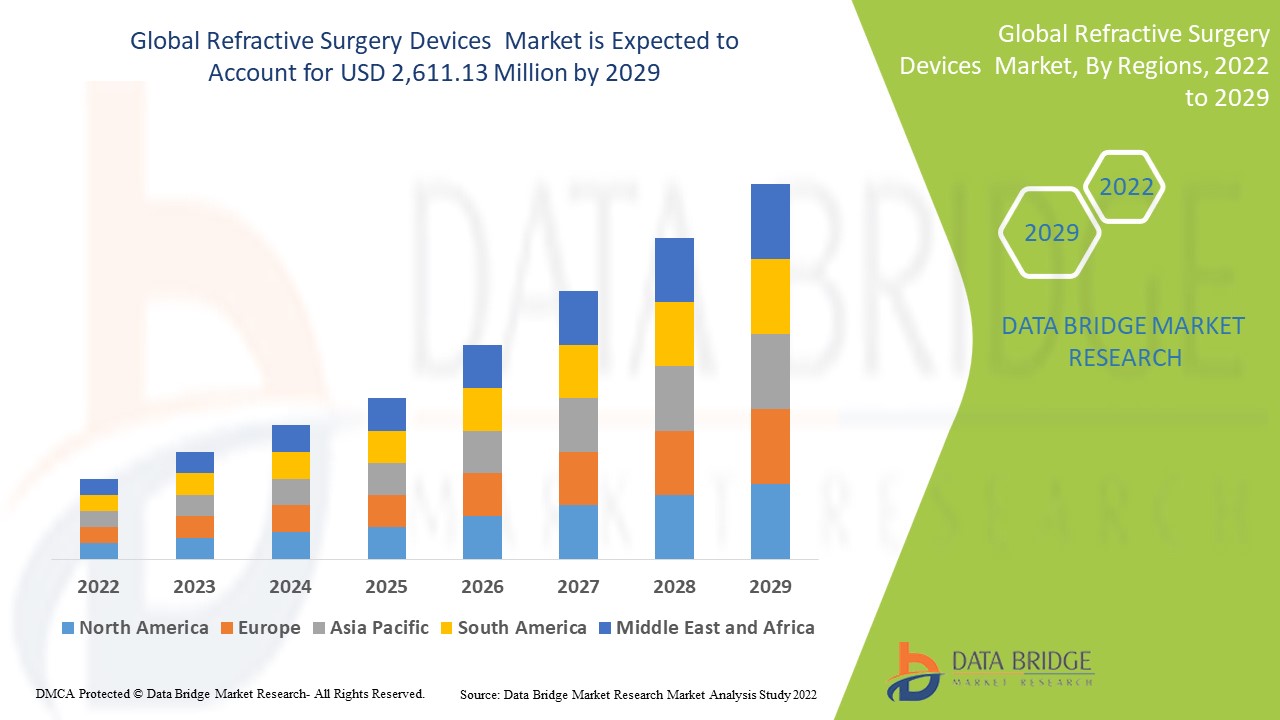Global Refractive Surgery Devices Market
Market Size in USD Million
CAGR :
% 
 USD
1,420.96 Million
USD
2,611.13 Million
2021
2029
USD
1,420.96 Million
USD
2,611.13 Million
2021
2029
| 2022 –2029 | |
| USD 1,420.96 Million | |
| USD 2,611.13 Million | |
|
|
|
|
Market Definition and Insights
Refractive surgery devices are used to improve or correct refractive errors such as nearsightedness (myopia), farsightedness (hyperopia), presbyopia, or astigmatism. These devices include excimer lasers, YAG Lasers, microkeratomes, and femtosecond lasers. Refractive surgeries highly reduce the dependency on eyeglasses or contact lenses. Various refractive devices are used in the market to treat vision defects.
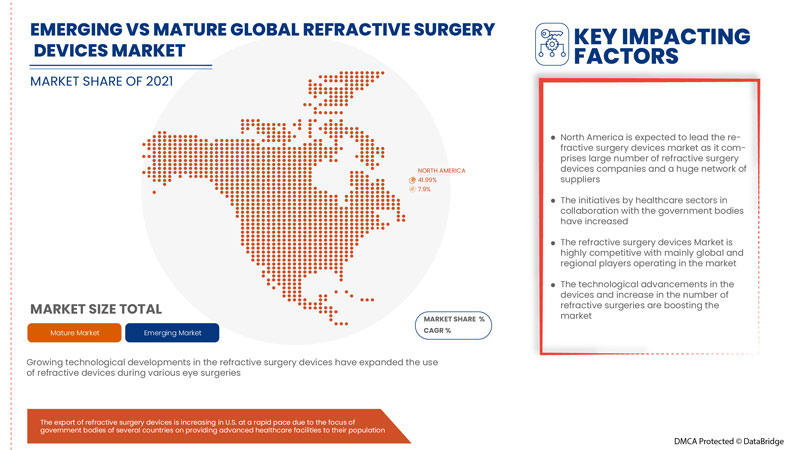
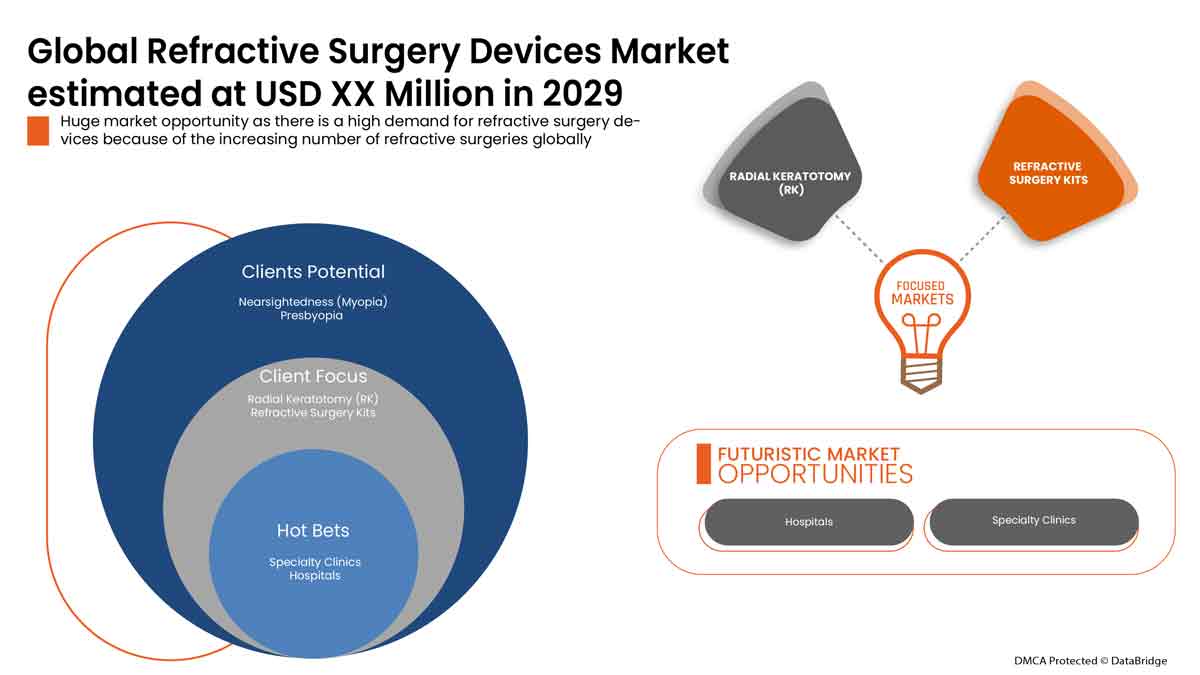
Refractive errors are caused due to the improper shape of the cornea or eyeballs. Refractive surgery procedure includes the reshaping of the eyeballs or cornea using various refractive surgery devices such as advanced lasers, LASIK treatments, photorefractive keratectomy, and various lenses such as phakic intraocular lenses and toric intraocular lenses.
Global refractive surgery devices market is expected to gain market growth in the forecast period of 2022 to 2029. Data Bridge Market Research analyses that the market is growing with a CAGR of 8.2% in the forecast period of 2022 to 2029 and is expected to reach USD 2,611.13 million by 2029 from USD 1,420.96 million in 2021.
|
Report Metric |
Details |
|
Forecast Period |
2022 to 2029 |
|
Base Year |
2021 |
|
Historic Years |
2020 (Customizable to 2019 - 2014) |
|
Quantitative Units |
Revenue in USD Million |
|
Segments Covered |
By Product Type (Laser, Phakic Intraocular Lens (IOL), Aberrometers/Wavefront Aberrometry, Surgical Instruments & Accessories, Refractive Surgery Kits, Pupillary Diameter Meters, Epikeratomes, Microkeratomes, Thermokeratoplasty, Limbal Relaxing Incision Kits and Others), Surgery Type (LASIK (Laser In-Situ Keratomileusis, Photorefractive Keratectomy (PRK), Phakic Intraocular Lenses (IOL), Astigmatic Keratotomy (AK), Automated Lamellar Keratoplasty (ALK), Intracorneal Ring (INTACS), Laser Thermal Keratoplasty (LTK), Conductive Keratoplasty (CK), Radial Keratotomy (RK) and Others), Application (Nearsightedness (Myopia), Farsightedness (Hyperopia), Astigmatism and Presbyopia), End User (Hospitals, Speciality Clinics, Ambulatory Surgical Centers and Others), Distribution Channel (Direct Tender, Third Party Distributors and Others) |
|
Countries Covered |
U.S., Canada, Mexico, Germany, France, U.K., Italy, Spain, Netherlands, Russia, Switzerland, Belgium, Turkey, Austria, Norway, Hungary, Lithuania, Ireland, Poland Rest of Europe, China, Japan, India, South Korea, Australia, Singapore, Thailand, Malaysia, Indonesia, Philippines, Vietnam, Rest Of Asia-Pacific, Brazil, Argentina, Peru, Rest Of South America, South Africa, Saudi Arabia, UAE, Egypt, Israel, Kuwait, Rest of the Middle East and Africa |
|
Market Players Covered |
Tracey Technologies, Bausch + Lomb Incorporated, BD, STAAR SURGICAL, SCHWIND eye-tech-solutions, Hoya Surgical Optics, Johnson & Johnson Services, Inc., Ophtec BV, Glaukos Corporation, Amplitude Laser, Reichert, Inc., NIDEK CO., LTD., Ziemer Ophthalmic Systems, ROWIAK GmbH, Moria, LENSAR, Inc., Topcon Canada Inc. (A subsidiary of Topcon Corporation), Aaren Scientific Inc., Rayner Intraocular Lenses Limited., iVIS Technologies, Alcon among others |
The Market Dynamics of the Refractive Surgery Devices Market include
Drivers
- Increase in technological advancement
Acceleration in technology development in the healthcare sector has tremendously increased in the last few years. Advancement in the technology of refractive surgery devices supports painless and uncomplicated treatment during the management of a disease. Moreover, innovation and up gradation in various refractive surgery devices assist in a precise and rapid result of disease diagnosis. Innovation in refractive surgery devices also provides the cost-effectiveness of technology-based therapeutic tools during disease treatment.
For instance,
- As per Contoura Vision India, it is found that Contoura vision surgery is the latest advanced eye surgery in the removal of specs. It is one of the safest technological advancements in eye surgery, which not only corrects the power of the spectacles but also works for corneal irregularities
- According to the Eye and Laser Centre Organisation, in May 2017, it was found that Visumax Femtosecond Laser technology is one of the most advanced refractive surgical treatments. It is capable of performing visual defects of the eyes
The increased technological advancements in various refractive surgery devices, such as advancements in lasers variable spot scanning, are expected to drive the refractive surgery devices market. Hence, growing innovation and technological advancement in refractive surgery devices are expected to bolster the market growth during the forecast period.
- Rise in healthcare expenditure
Over the last decade, healthcare expenditure has risen drastically for better patient healthcare service. The U.S. is the largest healthcare market, where the total health expenditure has increased drastically in the last few years. The fundamental purpose behind growing expenditure is to provide appropriate, affordable, and high-quality refractive surgery devices. To promote a healthier population and address the healthcare emergencies in developed and developing countries, respective government bodies and healthcare organizations are taking the initiative under accelerating healthcare expenditure.
For instance,
- According to the Health Affairs Organisation, U.S. health care spending has increased 9.7% to reach USD 4.1 trillion in 2020, which is a much faster rate than that seen in 2019
- According to the U.K. government, in 2020, the government have provided nearly GBP 250 million, which is about USD 300 million, to digitalize and advance diagnostics care across the NHS (National Health Service) using the latest technology. This funding has been allocated specifically for technological improvements to the NHS diagnostic services to detect and begin treating health conditions as early as possible
- The National Free Diagnostic Service Initiative has been rolled out as part of the National Health Mission by the Government of India. This was important to provide comprehensive and quality healthcare free of cost under one roof. With this initiative by the Indian government, several states have attempted several models to ensure the availability of diagnostics in public health facilities
Growing healthcare expenditure is also beneficial for further economic growth as well as healthcare sector growth. It significantly affects the development of new diagnostic tests and new surgical tools. Hence, huge health care expenditure is a favourable factor for the market's growth.
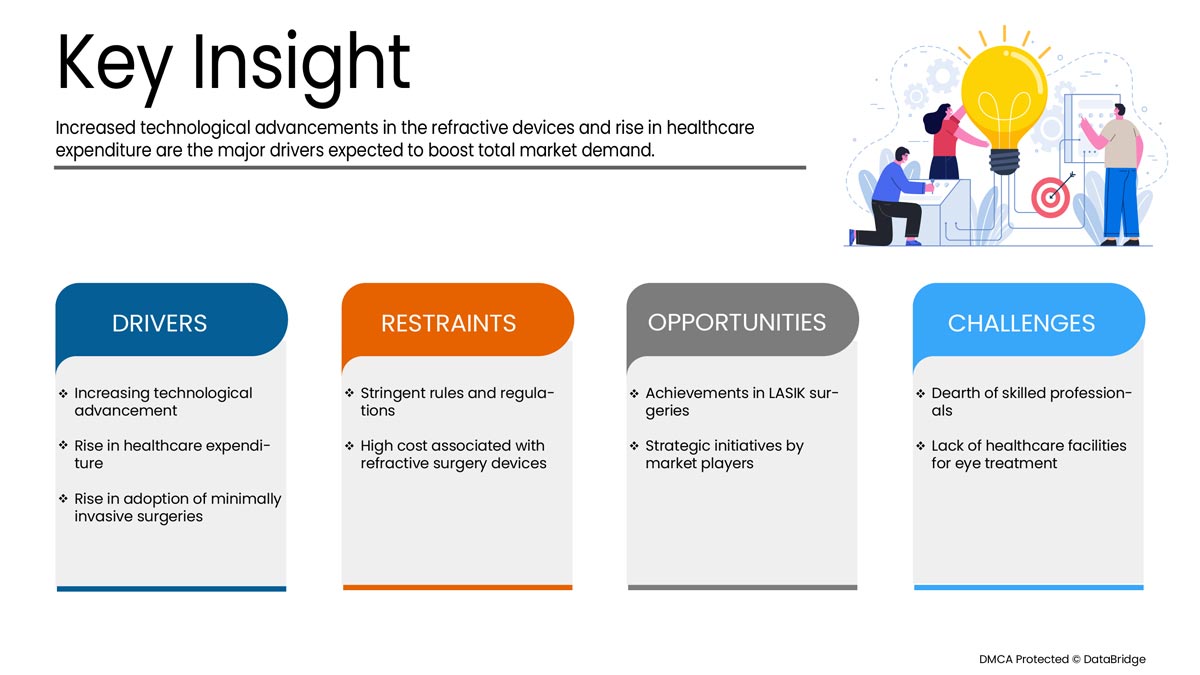
Opportunities
- Achievements in LASIK surgeries
The LASIK success rate or LASIK outcomes are well understood, with thousands of clinical studies looking at visual acuity and patient satisfaction. Recent research reported 99 percent of patients achieve better than 20/40 vision, and more than 90 percent achieve 20/20 or better. Furthermore, LASIK has an unprecedented 96 percent patient satisfaction rate, the highest of any elective procedure.
For instance,
- A 2016 study in the Journal of Cataract & Refractive Surgery found that LASIK has a 96% patient satisfaction rate
As per the article, "LASIK: Know the Rewards and the Risks," 2018
- Eric Donnenfeld, MD, a former president of the American Society of Cataract and Refractive Surgery, completed around 85,000 procedures over his 28-year career
- According to Market Scope, around 10 million Americans have had LASIK surgery since the FDA first approved it in 1999. Around 700,000 LASIK surgeries are done each year, but that's down from a peak of 1.4 million in 2000
Henceforth, the rising number of successful LASIK surgeries worldwide is positively associated with product development, product registration, and product launch. Thus, this is expected to drive the refractive surgery devices market in the coming years.
- Strategic initiatives by market players
An increase in the burden of refractive errors across the world have created more demand for the refractive surgery devices market. The main aim is to improve health management with the development of innovative products and surgery types for quality care with the convenient application. The key players in the refractive surgery devices market have taken strategic initiatives, which include product launches, acquisitions, and many more, and are expected to lead and create more opportunities in the refractive surgery devices market.
For instances,
- In June 2021, Glaukos Corporation received regulatory approval from the Therapeutic Goods Administration (TGA) of Australia for PRESERFLO MicroShunt. PRESERFLO MicroShunt aimed to lessen intraocular pressure (IOP) in the eyes of patients with primary open-angle glaucoma where IOP would remain uncontrollable along with being the maximum tolerated medical therapy and/or where glaucoma progression requires surgery
- In June 2021: Bausch & Lomb Incorporated signed an agreement with Lochan, a company in the Information Technology Services Industry. These companies aimed to develop the next generation of Bausch & Lomb Incorporated's eyeTELLIGENCE clinical decision support software. By utilizing the prevailing cloud-based infrastructure of eyeTELLIGENCE, this software would be developed to allow surgeons to effortlessly combine all factors of the cataract, retinal, and refractive surgery procedures to boost their total practice efficiency
- In March 2021, NIDEK unveiled RT-6100 CB for Windows, optional control software for the RT-6100 Intelligent Refractor, and the TS-610 Tabletop Refraction System. This software attunes to the distinct requirements of patients and operators. Moreover, the software enables refractions, which fulfill social distancing requirements
These many strategic products launched and acquisitions by major companies in the refractive surgery devices market have opened up an opportunity for companies worldwide. These strategies are allowing the companies to strengthen their footprints in the market. Therefore, it is predicted that strategic initiative is the golden opportunity for the market players to accelerate their revenue growth in the market.
Challenges/ Restraints
- Lack of awareness and people trust regarding the benefits of the procedure
In many countries, the general population is not aware of refractive surgery or its various benefits for refractive errors such as myopia astigmatism, presbyopia, and others. People are scared of surgeries that it will lead to some serious side effects which are expected to give a market a great challenge.
For instance,
- According to the study by the National Institute of Health (NIH) 2021, it stated that people refused to undergo surgery because they were worried about its complications and lacked information regarding the procedure. Moreover, the study showed that 82.5% of participants were unaware that refractive surgery could enhance their visual acuity due to the lack of awareness
- According to the study by the International Journal of Medicine in Developing Countries in 2019, it was stated that-
- 32.2% of the total participants thought that refractive surgery was dangerous and 9.5% thought that it causes advanced complications
- Also, the study from India showed that 64% of participants did not know that refractive surgery was able to improve their vision
The lack of awareness regarding the benefits of refractive surgery and people's fear of surgery complications is expected to create a great challenge for the market growth.
- Lack of healthcare facilities for eye treatment
The poverty-stricken population in low- and middle-income countries suffer more from blindness and ophthalmic disorders than the wealthier population. The advancement and strategic plans taken in developed countries are not equally initiated in low-income countries. Many low-income countries usually rely on community health workers, physician assistants, and cataract surgeons for their initial primary eye care. Ophthalmology in low-income countries (LIC) is very challenging due to its complexities such as tropical climates, frail electric grids, poor road and water infrastructure, limited diagnostic capability, and limited treatment options.
For instance,
- As per the article, "Innovative Diagnostic Tools for Ophthalmology in Low-Income Countries," the 2020 report states that the prevalence of blindness and ocular disorders in high-income countries is 0.3 per 1,000 people, but in low-income countries, the estimation is 1.5 per 1,000. This shows the unmet need for ophthalmology care in low-income countries
Another major problem in low-income countries is the lack of awareness among people regarding ocular pain and other disorders. Many research studies report the high requirement of low-income countries for eye health care, and their unmet needs are still gaining attention among many health care organizations.
For instance,
- In 2014, the British Journal of Ophthalmology reported that the vision 2020 plan initiated by the government is still far from achieved due to the lack of initiatives taken targeting middle and low-income countries
Hence, the poor healthcare facility for eye treatments in low and middle-income countries are considered the greatest challenge to the growth of the refractive surgery devices market.
Post COVID-19 Impact on Refractive Surgery Devices Market
The COVID-19 has affected the market. Lockdowns and isolation during pandemics restricted the movement of the masses. As a result surgeries date and times were delayed. Hence, the pandemic has negatively affected this market
Recent Development
- In July 2021, Johnson & Johnson Vision launched the VERITAS Vision System, next-generation phacoemulsification (phaco) system. This system is developed to look after three important areas: surgeon efficiency, patient safety, and comfort. This has increased the company's product portfolio
Global Refractive Surgery Devices Market Scope
Global Refractive surgery devices market is segmented into product type, surgery type, application, end user, and distribution channel. The growth amongst these segments will help you analyse meagre growth segments in the industries and provide the users with a valuable market overview and market insights to make strategic decisions to identify core market applications.
Product Type
- Laser
- Phakic Intraocular Lens (IOL)
- Aberrometers / Wavefront Aberrometry
- Surgical Instruments & Accessories
- Refractive Surgery Kits
- Pupillary Diameter Meters
- Epikeratomes
- Microkeratomes
- Thermokeratoplasty
- Limbal Relaxing Incision Kits
- Others
On the basis of product type, the refractive surgery devices market is segmented into a laser, phakic intraocular lens (IOL), aberrometer/wavefront aberrometry, surgical instruments & accessories, refractive surgery kits, pupillary diameter meters, epikeratomes, microkeratomes, thermokeratoplasty, limbal relaxing incision kits, and others.
Surgery Type
- Lasik (Laser In-Situ Keratomileusis)
- Photorefractive Keratectomy (PRK)
- Phakic Intraocular Lenses (IOL)
- Astigmatic Keratotomy (AK)
- Automated Lamellar Keratoplasty (ALK)
- Intracorneal Ring (INTACS)
- Laser Thermal Keratoplasty (LTK)
- Conductive Keratoplasty (CK)
- Radial Keratotomy (RK)
- Others
On the basis of surgery type, the refractive surgery devices market is segmented into LASIK (laser in-situ keratomileusis), photorefractive keratectomy (PRK), phakic intraocular lenses (IOL), astigmatic keratotomy (AK), automated lamellar keratoplasty (ALK), intracorneal ring (INTACS), laser thermal keratoplasty (LTK), conductive keratoplasty (CK), radial keratotomy (RK), and others.
Application
- Nearsightedness (Myopia)
- Farsightedness (Hyperopia)
- Astigmatism
- Presbyopia
On the basis of application, the refractive surgery devices market is segmented into nearsightedness (myopia), farsightedness (hyperopia), astigmatism, and presbyopia.
End User
- Hospitals
- Specialty Clinics
- Ambulatory Surgical Centers
- Others
On the basis of end user, the refractive surgery devices market is segmented into hospitals, specialty clinics, ambulatory surgical centres, and others.
Distribution Channel
- Direct Tender
- Third Party Distributors
- Others

On the basis of distribution channel, the refractive surgery devices market is segmented into direct tender, third party distributors, and others.
Refractive Surgery Devices Market Regional Analysis/Insights
The refractive surgery devices market is analysed and market size insights and trends are provided by country, product type, surgery type, application, end user, and distribution channel as referenced above.
The countries covered in the refractive surgery devices market report are the U.S., Canada and Mexico in North America, Germany, France, U.K., Netherlands, Switzerland, Belgium, Russia, Italy, Spain, Turkey, Rest of Europe in Europe, China, Japan, India, South Korea, Singapore, Malaysia, Australia, Thailand, Indonesia, Philippines, Rest of Asia-Pacific (APAC) in the Asia-Pacific (APAC), Saudi Arabia, U.A.E, South Africa, Egypt, Israel, Rest of Middle East and Africa (MEA) as a part of Middle East and Africa (MEA), Brazil, Argentina and Rest of South America as part of South America.
North America is expected to dominate the market due to the growing demand of refractive surgeries among the population.
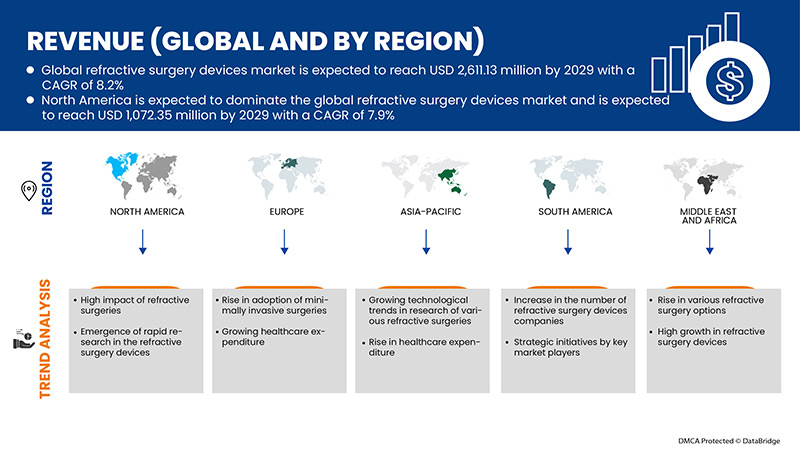
The country section of the report also provides individual market impacting factors and changes in regulations in the market that impact the current and future trends of the market. Data points, such as new and replacement sales, country demographics, disease epidemiology, and import-export tariffs, are some of the major pointers used to forecast the market scenario for individual countries. In addition, the presence and availability of global brands and their challenges faced due to high competition from local and domestic brands, and impact of sales channels are considered while providing forecast analysis of the country data.
Competitive Landscape and Refractive Surgery Devices Market Share Analysis
The refractive surgery devices market competitive landscape provides details by the competitors. Details included are company overview, company financials, revenue generated, market potential, investment in research and development, new market initiatives, global presence, production sites and facilities, production capacities, company strengths and weaknesses, product launch, product width and breadth, and application dominance. The above data points provided are only related to the companies' focus on refractive surgery devices market.
Some of the major companies dealing in the refractive surgery devices market are Tracey Technologies, Bausch + Lomb Incorporated, BD, STAAR SURGICAL, SCHWIND eye-tech-solutions, Hoya Surgical Optics, Johnson & Johnson Services, Inc., Ophtec BV, Glaukos Corporation, Amplitude Laser, Reichert, Inc., NIDEK CO., LTD., Ziemer Ophthalmic Systems, ROWIAK GmbH, Moria, LENSAR, Inc., Topcon Canada Inc. (A subsidiary of Topcon Corporation), Aaren Scientific Inc., Rayner Intraocular Lenses Limited., iVIS Technologies, Alcon, among others.
Research Methodology
Data collection and base year analysis are done using data collection modules with large sample sizes. The market data is analysed and estimated using market statistical and coherent models. In addition, market share analysis and key trend analysis are the major success factors in the market report. The key research methodology used by DBMR research team is data triangulation which involves data mining, analysis of the impact of data variables on the market, and primary (industry expert) validation. Apart from this, data models include Vendor Positioning Grid, Market Time Line Analysis, Market Overview and Guide, Company Positioning Grid, Company Market Share Analysis, Standards of Measurement, Global vs. Regional and Vendor Share Analysis. Please request analyst call in case of further inquiry.
SKU-
Get online access to the report on the World's First Market Intelligence Cloud
- Interactive Data Analysis Dashboard
- Company Analysis Dashboard for high growth potential opportunities
- Research Analyst Access for customization & queries
- Competitor Analysis with Interactive dashboard
- Latest News, Updates & Trend analysis
- Harness the Power of Benchmark Analysis for Comprehensive Competitor Tracking
Table of Content
1 INTRODUCTION
1.1 OBJECTIVES OF THE STUDY
1.2 MARKET DEFINITION
1.3 OVERVIEW OF GLOBAL REFRACTIVE SURGERY DEVICES MARKET
1.4 CURRENCY AND PRICING
1.5 LIMITATION
1.6 MARKETS COVERED
2 MARKET SEGMENTATION
2.1 KEY TAKEAWAYS
2.2 ARRIVING AT THE GLOBAL REFRACTIVE SURGERY DEVICES MARKET SIZE
2.2.1 VENDOR POSITIONING GRID
2.2.2 TECHNOLOGY LIFE LINE CURVE
2.2.3 TRIPOD DATA VALIDATION MODEL
2.2.4 MARKET GUIDE
2.2.5 MULTIVARIATE MODELLING
2.2.6 TOP TO BOTTOM ANALYSIS
2.2.7 CHALLENGE MATRIX
2.2.8 APPLICATION COVERAGE GRID
2.2.9 STANDARDS OF MEASUREMENT
2.2.10 VENDOR SHARE ANALYSIS
2.2.11 SALES VOLUME DATA
2.2.12 DATA POINTS FROM KEY PRIMARY INTERVIEWS
2.2.13 DATA POINTS FROM KEY SECONDARY DATABASES
2.3 GLOBAL REFRACTIVE SURGERY DEVICES MARKET: RESEARCH SNAPSHOT
2.4 ASSUMPTIONS
3 MARKET OVERVIEW
3.1 DRIVERS
3.2 RESTRAINTS
3.3 OPPORTUNITIES
3.4 CHALLENGES
4 EXECUTIVE SUMMARY
5 PREMIUM INSIGHTS
5.1 PESTEL ANALYSIS
5.2 PORTER’S 5 FORCES MODEL
6 INDUSTRY INSIGHTS
7 REGULATORY SCENARIO
8 IMPACT OF COVID-19 PANDEMIC ON THE MARKET
8.1 PRICE IMPACT
8.2 IMPACT ON DEMAND
8.3 IMPACT ON SUPPLY CHAIN
8.4 STRATEGIC DECISIONS FOR MANUFACTURERS
8.5 CONCLUSION
9 GLOBAL REFRACTIVE SURGERY DEVICES MARKET, BY PRODUCT TYPE
9.1 OVERVIEW
9.2 ABERROMETERS / WAVEFRONT ABERROMETRY
9.3 EPIKERATOMES
9.4 EXCIMER LASERS
9.5 FEMTOSECOND LASER/ULTRASHORT PULSE LASER
9.6 LIMBAL RELAXING INCISION KITS
9.7 MICROKERATOMES
9.8 PHAKIC INTRAOCULAR LENS (IOL)
9.9 PUPILLARY DIAMETER METERS
9.1 REFRACTIVE SURGERY KITS
9.11 SURGICAL INSTRUMENTS & ACCESSORIES
9.12 THERMOKERATOPLASTY
9.13 OTHERS
10 GLOBAL REFRACTIVE SURGERY DEVICES MARKET, BY SURGERY TYPE
10.1 OVERVIEW
10.2 LASIK (LASER IN-SITU KERATOMILEUSIS)
10.3 PHOTOREFRACTIVE KERATECTOMY (PRK)
10.4 RADIAL KERATOTOMY (RK)
10.5 ASTIGMATIC KERATOTOMY (AK)
10.6 AUTOMATED LAMELLAR KERATOPLASTY (ALK)
10.7 LASER THERMAL KERATOPLASTY (LTK)
10.8 CONDUCTIVE KERATOPLASTY (CK)
10.9 INTRACORNEAL RING (INTACS)
10.1 OTHERS
11 GLOBAL REFRACTIVE SURGERY DEVICES MARKET, BY APPLICATION
11.1 OVERVIEW
11.2 NEARSIGHTEDNESS (MYOPIA)
11.3 FARSIGHTEDNESS (HYPEROPIA)
11.4 ASTIGMATISM
11.5 PRESBYOPIA
12 GLOBAL REFRACTIVE SURGERY DEVICES MARKET, BY END USER
12.1 OVERVIEW
12.2 HOSPITALS
12.3 SPECIALITY CLINICS
12.4 AMBULATORY SURGICAL CENTERS
12.5 OTHERS
13 GLOBAL REFRACTIVE SURGERY DEVICES MARKET, BY DISTRIBUTION CHANNEL
13.1 OVERVIEW
13.2 DIRECT TENDER
13.3 THIRD PARTY DISTRIBUTORS
13.4 OTHERS
14 GLOBAL REFRACTIVE SURGERY DEVICES MARKET, COMPANY LANDSCAPE
14.1 COMPANY SHARE ANALYSIS: GLOBAL
14.2 COMPANY SHARE ANALYSIS: NORTH AMERICA
14.3 COMPANY SHARE ANALYSIS: EUROPE
14.4 COMPANY SHARE ANALYSIS: ASIA-PACIFIC
14.5 MERGERS & ACQUISITIONS
14.6 NEW PRODUCT DEVELOPMENT & APPROVALS
14.7 EXPANSIONS
14.8 REGULATORY CHANGES
14.9 PARTNERSHIP AND OTHER STRATEGIC DEVELOPMENTS
15 GLOBAL REFRACTIVE SURGERY DEVICES MARKET, BY GEOGRAPHY
15.1 GLOBAL REFRACTIVE SURGERY DEVICES MARKET, (ALL SEGMENTATION PROVIDED ABOVE IS REPRESENTED IN THIS CHAPTER BY COUNTRY)
15.1.1 NORTH AMERICA
15.1.1.1. U.S.
15.1.1.2. CANADA
15.1.1.3. MEXICO
15.1.2 EUROPE
15.1.2.1. GERMANY
15.1.2.2. FRANCE
15.1.2.3. U.K.
15.1.2.4. HUNGARY
15.1.2.5. LITHUANIA
15.1.2.6. AUSTRIA
15.1.2.7. IRELAND
15.1.2.8. NORWAY
15.1.2.9. POLAND
15.1.2.10. ITALY
15.1.2.11. SPAIN
15.1.2.12. RUSSIA
15.1.2.13. TURKEY
15.1.2.14. BELGIUM
15.1.2.15. NETHERLANDS
15.1.2.16. SWITZERLAND
15.1.2.17. REST OF EUROPE
15.1.3 ASIA-PACIFIC
15.1.3.1. JAPAN
15.1.3.2. CHINA
15.1.3.3. SOUTH KOREA
15.1.3.4. INDIA
15.1.3.5. AUSTRALIA
15.1.3.6. SINGAPORE
15.1.3.7. THAILAND
15.1.3.8. MALAYSIA
15.1.3.9. INDONESIA
15.1.3.10. PHILIPPINES
15.1.3.11. VIETNAM
15.1.3.12. REST OF ASIA-PACIFIC
15.1.4 SOUTH AMERICA
15.1.4.1. BRAZIL
15.1.4.2. ARGENTINA
15.1.4.3. PERU
15.1.4.4. REST OF SOUTH AMERICA
15.1.5 MIDDLE EAST AND AFRICA
15.1.5.1. SOUTH AFRICA
15.1.5.2. SAUDI ARABIA
15.1.5.3. UAE
15.1.5.4. EGYPT
15.1.5.5. KUWAIT
15.1.5.6. ISRAEL
15.1.5.7. REST OF MIDDLE EAST AND AFRICA
15.2 KEY PRIMARY INSIGHTS: BY MAJOR COUNTRIES
16 GLOBAL REFRACTIVE SURGERY DEVICES MARKET, SWOT AND DBMR ANALYSIS
17 GLOBAL REFRACTIVE SURGERY DEVICES MARKET, COMPANY PROFILE
17.1 JOHNSON & JOHNSON SERVICES, INC.
17.1.1 COMPANY OVERVIEW
17.1.2 REVENUE ANALYSIS
17.1.3 GEOGRAPHIC PRESENCE
17.1.4 PRODUCT PORTFOLIO
17.1.5 RECENT DEVELOPMENTS
17.2 NIDEK USA, INC.
17.2.1 COMPANY OVERVIEW
17.2.2 REVENUE ANALYSIS
17.2.3 GEOGRAPHIC PRESENCE
17.2.4 PRODUCT PORTFOLIO
17.2.5 RECENT DEVELOPMENTS
17.3 LASERSIGHT
17.3.1 COMPANY OVERVIEW
17.3.2 REVENUE ANALYSIS
17.3.3 GEOGRAPHIC PRESENCE
17.3.4 PRODUCT PORTFOLIO
17.3.5 RECENT DEVELOPMENTS
17.4 ALCON INC.
17.4.1 COMPANY OVERVIEW
17.4.2 REVENUE ANALYSIS
17.4.3 GEOGRAPHIC PRESENCE
17.4.4 PRODUCT PORTFOLIO
17.4.5 RECENT DEVELOPMENTS
17.5 BAUSCH + LOMB INCORPORATED
17.5.1 COMPANY OVERVIEW
17.5.2 REVENUE ANALYSIS
17.5.3 GEOGRAPHIC PRESENCE
17.5.4 PRODUCT PORTFOLIO
17.5.5 RECENT DEVELOPMENTS
17.6 ZIEMER OPHTHALMIC SYSTEMS
17.6.1 COMPANY OVERVIEW
17.6.2 REVENUE ANALYSIS
17.6.3 GEOGRAPHIC PRESENCE
17.6.4 PRODUCT PORTFOLIO
17.6.5 RECENT DEVELOPMENTS
17.7 BD
17.7.1 COMPANY OVERVIEW
17.7.2 REVENUE ANALYSIS
17.7.3 GEOGRAPHIC PRESENCE
17.7.4 PRODUCT PORTFOLIO
17.7.5 RECENT DEVELOPMENTS
17.8 ROWIAK GMBH
17.8.1 COMPANY OVERVIEW
17.8.2 REVENUE ANALYSIS
17.8.3 GEOGRAPHIC PRESENCE
17.8.4 PRODUCT PORTFOLIO
17.8.5 RECENT DEVELOPMENTS
17.9 ELLEX
17.9.1 COMPANY OVERVIEW
17.9.2 REVENUE ANALYSIS
17.9.3 GEOGRAPHIC PRESENCE
17.9.4 PRODUCT PORTFOLIO
17.9.5 RECENT DEVELOPMENTS
17.1 MORIA
17.10.1 COMPANY OVERVIEW
17.10.2 REVENUE ANALYSIS
17.10.3 GEOGRAPHIC PRESENCE
17.10.4 PRODUCT PORTFOLIO
17.10.5 RECENT DEVELOPMENTS
17.11 STAAR SURGICAL
17.11.1 COMPANY OVERVIEW
17.11.2 REVENUE ANALYSIS
17.11.3 GEOGRAPHIC PRESENCE
17.11.4 PRODUCT PORTFOLIO
17.11.5 RECENT DEVELOPMENTS
17.12 LENSAR, INC.
17.12.1 COMPANY OVERVIEW
17.12.2 REVENUE ANALYSIS
17.12.3 GEOGRAPHIC PRESENCE
17.12.4 PRODUCT PORTFOLIO
17.12.5 RECENT DEVELOPMENTS
17.13 SCHWIND EYE-TECH-SOLUTIONS
17.13.1 COMPANY OVERVIEW
17.13.2 REVENUE ANALYSIS
17.13.3 GEOGRAPHIC PRESENCE
17.13.4 PRODUCT PORTFOLIO
17.13.5 RECENT DEVELOPMENTS
17.14 LUMENIS BE LTD.
17.14.1 COMPANY OVERVIEW
17.14.2 REVENUE ANALYSIS
17.14.3 GEOGRAPHIC PRESENCE
17.14.4 PRODUCT PORTFOLIO
17.14.5 RECENT DEVELOPMENTS
17.15 PRECISION LENS
17.15.1 COMPANY OVERVIEW
17.15.2 REVENUE ANALYSIS
17.15.3 GEOGRAPHIC PRESENCE
17.15.4 PRODUCT PORTFOLIO
17.15.5 RECENT DEVELOPMENTS
17.16 TOPCON CORPORATION
17.16.1 COMPANY OVERVIEW
17.16.2 REVENUE ANALYSIS
17.16.3 GEOGRAPHIC PRESENCE
17.16.4 PRODUCT PORTFOLIO
17.16.5 RECENT DEVELOPMENTS
17.17 HOYA SURGICAL OPTICS
17.17.1 COMPANY OVERVIEW
17.17.2 REVENUE ANALYSIS
17.17.3 GEOGRAPHIC PRESENCE
17.17.4 PRODUCT PORTFOLIO
17.17.5 RECENT DEVELOPMENTS
17.18 AAREN SCIENTIFIC INC.
17.18.1 COMPANY OVERVIEW
17.18.2 REVENUE ANALYSIS
17.18.3 GEOGRAPHIC PRESENCE
17.18.4 PRODUCT PORTFOLIO
17.18.5 RECENT DEVELOPMENTS
17.19 OPHTEC BV
17.19.1 COMPANY OVERVIEW
17.19.2 REVENUE ANALYSIS
17.19.3 GEOGRAPHIC PRESENCE
17.19.4 PRODUCT PORTFOLIO
17.19.5 RECENT DEVELOPMENTS
17.2 RAYNER INTRAOCULAR LENSES LIMITED
17.20.1 COMPANY OVERVIEW
17.20.2 REVENUE ANALYSIS
17.20.3 GEOGRAPHIC PRESENCE
17.20.4 PRODUCT PORTFOLIO
17.20.5 RECENT DEVELOPMENTS
17.21 GLAUKOS
17.21.1 COMPANY OVERVIEW
17.21.2 REVENUE ANALYSIS
17.21.3 GEOGRAPHIC PRESENCE
17.21.4 PRODUCT PORTFOLIO
17.21.5 RECENT DEVELOPMENTS
*NOTE: THE COMPANIES PROFILED IS NOT EXHAUSTIVE LIST AND IS AS PER OUR PREVIOUS CLIENT REQUIREMENT. WE PROFILE MORE THAN 100 COMPANIES IN OUR STUDY AND HENCE THE LIST OF COMPANIES CAN BE MODIFIED OR REPLACED ON REQUEST
18 RELATED REPORTS
19 CONCLUSION
20 QUESTIONNAIRE
21 ABOUT DATA BRIDGE MARKET RESEARCH

Research Methodology
Data collection and base year analysis are done using data collection modules with large sample sizes. The stage includes obtaining market information or related data through various sources and strategies. It includes examining and planning all the data acquired from the past in advance. It likewise envelops the examination of information inconsistencies seen across different information sources. The market data is analysed and estimated using market statistical and coherent models. Also, market share analysis and key trend analysis are the major success factors in the market report. To know more, please request an analyst call or drop down your inquiry.
The key research methodology used by DBMR research team is data triangulation which involves data mining, analysis of the impact of data variables on the market and primary (industry expert) validation. Data models include Vendor Positioning Grid, Market Time Line Analysis, Market Overview and Guide, Company Positioning Grid, Patent Analysis, Pricing Analysis, Company Market Share Analysis, Standards of Measurement, Global versus Regional and Vendor Share Analysis. To know more about the research methodology, drop in an inquiry to speak to our industry experts.
Customization Available
Data Bridge Market Research is a leader in advanced formative research. We take pride in servicing our existing and new customers with data and analysis that match and suits their goal. The report can be customized to include price trend analysis of target brands understanding the market for additional countries (ask for the list of countries), clinical trial results data, literature review, refurbished market and product base analysis. Market analysis of target competitors can be analyzed from technology-based analysis to market portfolio strategies. We can add as many competitors that you require data about in the format and data style you are looking for. Our team of analysts can also provide you data in crude raw excel files pivot tables (Fact book) or can assist you in creating presentations from the data sets available in the report.
